
Cheesecake is a rich, sweet dessert that shouldn't go to waste, which is why freezing leftover cheesecake is a good idea if you plan to store it for longer than a week. Fortunately, if you have properly defrosted your cheesecake in the refrigerator, you can usually safely refreeze it without having to worry about spoilage. However, continual freezing and thawing may negatively affect your cheesecake's texture and taste.
Chilling Out Cheesecake
Because cheesecake is made with dairy products, including cream cheese as the main ingredient, you must refrigerate it at 40 degrees Fahrenheit or below to prevent the growth of harmful mold and bacteria. Refrigerated cheesecake has a shelf life of about one week, but if you put it in the freezer, it can last for around six to eight months at 0 F, according to the EatByDate website. If your cheesecake has been consistently refrigerated for less than seven days, you can safely freeze it, even if it had previously been frozen. Discard cheesecake that's been left out at room temperature for more than two hours.
Don't Freeze Spoiled Cheesecake
While freezing greatly slows the growth of most harmful spoilage microorganisms, it doesn't kill them if they've already begun to develop. What this means is that if your cheesecake is showing visible signs of mold growth, developed a sour smell or has started to change in color or texture, freezing won't make it edible. Generally, if your cheesecake has been refrigerated for a total of seven days, including all days between each freezing, it's time to toss it. If it is good, wrap it up in plastic or aluminum foil to prevent the freezer from drying out the cake or from the cake picking up any unpleasant odors.
The Cycle of Freezing and Thawing
If your cheesecake is still good and you refreeze it, ice crystals will form within it because it contains moisture. Once you thaw the cheesecake in the refrigerator, these ice crystals will melt and may cause the cake to become a bit soggy in some parts, like the crust of the cake, and dry in others. This melting process could also change the texture of the cake to a gritty and unpleasant one, rather than one that is smooth and creamy. While these unpleasant effects may occur slightly after refreezing the cake once, the ice crystals that form will become larger in each successive refreeze, thus negatively affecting the cake more each time, warns Food Product Design.
Wrap It Individually
Cut your cheesecake into individual slices just after you bake it or after you thaw a store-bought frozen cheesecake. Wrap each individual slice in plastic or aluminum foil and freeze them. This way, you can thaw only the pieces you are going to eat within a few days in the refrigerator rather than freezing, thawing and then refreezing your entire cheesecake each time you want to eat it. Don't freeze any toppings or whipped cream on top of the cheesecake; instead keep these items refrigerated and add them to the thawed slices as needed. Always thaw your cheesecake slices in the refrigerator overnight or for less than two hours at room temperature to avoid spoilage.
Related Articles

How Long Can Cupcakes Be Stored After ...
How to Freeze a Fruitcake
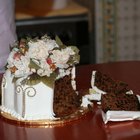
How Early Can You Make a Wedding Cake?

How to Keep Cake Moist Overnight ...
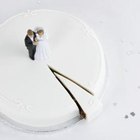
How to Freeze Wedding Cake
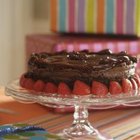
How to Make a Box Cake Firmer to Frost

Do Boston Cream Pie Cupcakes Need ...
How to Freeze a Baguette

How to Store Homemade Fruitcakes

How to Heat Canned Icing

Do Cream Cheese-Filled Cupcakes Need ...

How to Defrost a Frozen Cake With ...

How to Freeze Croissants

How Long Before an Event Should I Bake ...
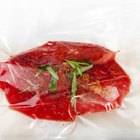
Rules for Thawing and Refreezing Meat

How Long Is Cake Safe to Eat?

How to Store Uncooked Smoked Ham

Can I Freeze Unused Cupcake Batter?

Should You Frost a Frozen Cake or Wait ...
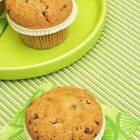
How to Keep Muffins From Going Moldy
References
- The Eli's Cheesecake Company: Can I Refreeze the Product?
- Still Tasty: Baked Goods -- Cheesecake
- EatByDate: How Long Does Cheesecake Last?
- Texas A&M AgriLife Extension: Introduction to the Microbiology of Food
- European Food Information Council: Chilling Out -- Freezing Foods for Quality and Safety
- North Dakota State University Extension Service: Food Freezing Guide
- Food Product Design: Freeze/Thaw-Stability
Writer Bio
Based in Las Vegas, Susan Paretts has been writing since 1998. She writes about many subjects including pets, finances, crafts, food, home improvement, shopping and going green. Her articles, short stories and reviews have appeared on City National Bank's website and on The Noseprint. Paretts holds a Master of Professional Writing from the University of Southern California.
Photo Credits
Hemera Technologies/PhotoObjects.net/Getty Images